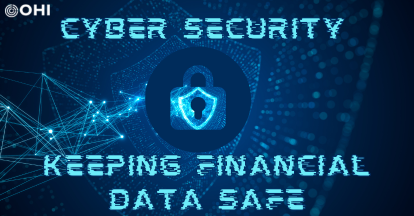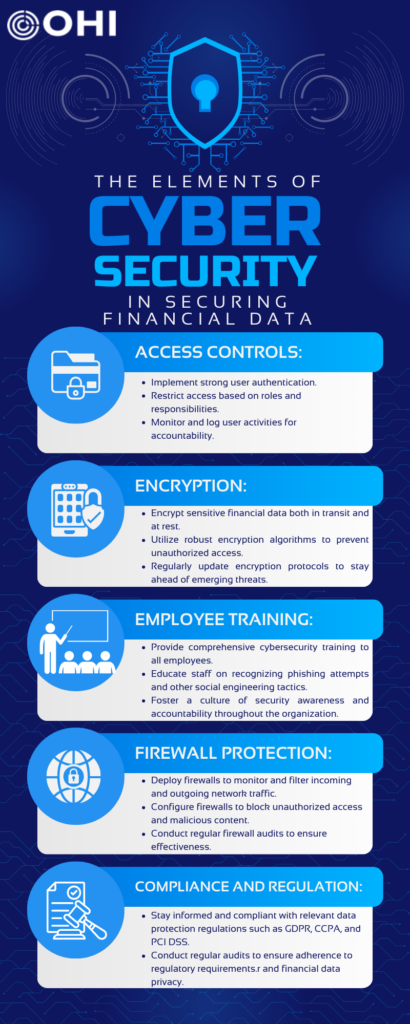
Preventing Cyber Threats: Strategies to Safeguard Financial Data
- April 17, 2024
- OHI

In today’s digital age, cyber threats have become an ever-increasing concern for businesses across all industries, especially those handling sensitive financial data. As an accounting outsourcing company providing offshore accounting services, we understand the paramount importance of robust cybersecurity measures to protect our clients’ confidential information. In this blog post, we will explore essential strategies to safeguard financial data and mitigate the risks posed by cyber threats.
Access control is the first line of defense against unauthorized access to your financial data. Implement multi-factor authentication (MFA) for all systems and applications that handle sensitive information. MFA makes security stronger by asking users to prove their identity in at least two ways, like using a password and then entering a code that’s sent to their phone. This helps keep information safe even if someone else knows the password. This significantly reduces the risk of unauthorized access, even if one authentication factor is compromised.
Additionally, implement role-based access controls (RBAC) to ensure that only authorized personnel have access to specific financial data and systems based on their job responsibilities. Regularly review and update access privileges to prevent unauthorized access and maintain a strict principle of least privilege.
Encryption is a critical security measure that scrambles data, making it unreadable to anyone without the proper decryption key. Implement end-to-end encryption for all financial data, both at rest (stored on servers or devices) and in transit (during transmission over networks). This ensures that even if the data is intercepted or stolen, it remains unintelligible to unauthorized parties.
Choose industry-standard encryption algorithms and protocols, such as AES-256 for data at rest and TLS/SSL for data in transit. Regularly update and rotate encryption keys to maintain the highest level of security.

Cyber threats, such as ransomware attacks, can potentially corrupt or deny access to your financial data. To mitigate the impact of such attacks, implement robust backup and recovery strategies. Regularly back up your financial data to secure, off-site
locations or cloud-based storage solutions. Ensure that backups are encrypted and regularly tested to verify their integrity and recoverability.
Additionally, develop and test a comprehensive disaster recovery plan that outlines the steps to be taken in the event of a cyber-attack or data breach. This plan should include procedures for restoring data from backups, communicating with stakeholders, and minimizing downtime and data loss.
Cybersecurity is a continuous effort that needs constant monitoring and updates to stay effective Conduct regular security audits to identify potential vulnerabilities in your systems, processes, and policies. Engage with independent third-party security experts to perform penetration testing, which simulates real-world cyber-attacks to assess the effectiveness of your security controls and identify areas for improvement.
Based on the findings from security audits and penetration testing, implement necessary remediation measures and update your security policies and procedures accordingly
Human error is often cited as one of the leading causes of data breaches and cyber attacks. Investing in comprehensive security awareness training for all employees, including offshore teams, is crucial to mitigating this risk. Educate your staff on recognizing and responding to various cyber threats, such as phishing attempts, social engineering tactics, and malware infections.
Encourage a culture of cybersecurity awareness by regularly updating employees on the latest threats, best practices, and the importance of maintaining strict security protocols. Implement policies and procedures for reporting suspected security incidents promptly.
Software vulnerabilities often serve as gateways for cyber attackers.. Regularly monitor and install security updates and patches for all software, operating systems, and applications used within your organization. Many software vendors release updates to address known vulnerabilities and security flaws, and failing to apply these updates can leave your systems vulnerable to exploitation.
Implement a robust patch management process that includes testing and deploying updates in a timely manner, while minimizing potential disruptions to business operations

While implementing robust cybersecurity measures is essential, no system is entirely immune to cyber threats. Consider purchasing cyber insurance to protect your business against the financial impact of a data breach or cyber attack. Cyber insurance can help cover costs associated with data recovery, legal fees, customer notifications, and potential regulatory fines.
When evaluating cyber insurance policies, carefully review the coverage details, exclusions, and requirements to ensure that they align with your specific needs and risk profile.
In the dynamic world of accounting outsourcing, rigorous cybersecurity is essential, not optional, due to the continuous international flow of financial data. By implementing strong access controls, encrypting data, maintaining robust backup and recovery plans, and offering ongoing security training, we effectively protect our clients’ sensitive information from emerging cyber threats. Through regular security audits and updates, we ensure our defenses are resilient and adaptive. Committed to exceeding industry standards, we continuously refine our security measures, not only to protect data but to preserve the trust our clients have in us as their outsourcing partner, thereby ensuring their financial information remains secure and fostering a reliable business environment.
Contact us for a customized NO OBLIGATION proposal for outsourcing your accounting activities.









